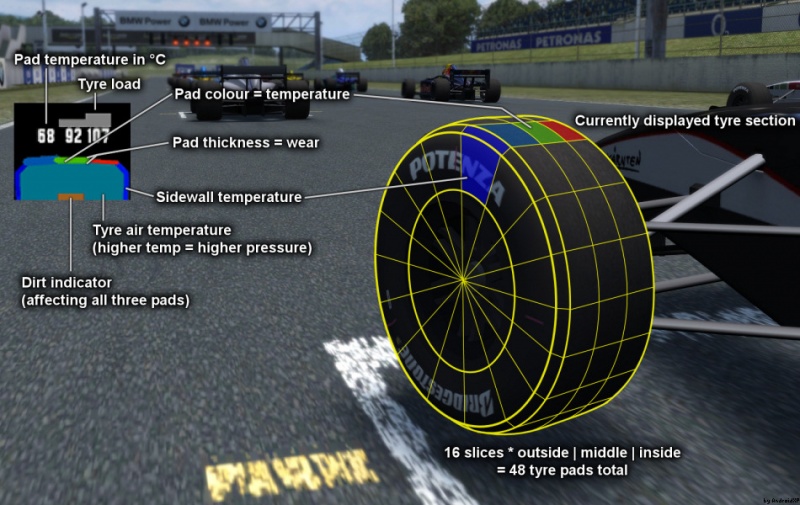Hi.
Someone is going to kill me if the tyre physics release gets extended because of this XD.
Let's see... I know Scawen want to create the most realistic tyre physics. Maybe he is working on this too or he is done with it. My suggestion:
This is the actual tyre on LFS:

The tyre is a polygon. Each side of the polygon is independent from the others. This is OK, probably the new tyre physics will allow a more detailed polygon, I agree.
However, only the polygon in contact with the ground suffer interaction with it. This causes a serious realistic problem. When you brake hard and the wheel locks, only the side of the polygon in contact to the ground will worn.
In a picture:

You can check this by looking at the replay attached, you can reach easily 999ºC on a side without blowing up the tyre. It will only blow up by wear or by reaching 200ºC in all the wheel by average (getting +999ºC on multiple sides).
At low speed you will see in the replay that the car bounces a bit when the worn side of the polygon touches the ground, perfect. But at higher speed the bounces get really smooth and the suspension doesn't get damaged too much.
My suggestion is the following: Neighbour sides of the polygon should be worn if the side touching the ground depth reach their height. (A true wheel lock)

This could be done by maths instead of multiple polygon-ground contact. <<< I assume Scawen is working also on this.
From mythbusters XD:
https://www.youtube.com/watch?v=QF7odK55gkI
By the way, sorry if it's hard to understand me
Someone is going to kill me if the tyre physics release gets extended because of this XD.
Let's see... I know Scawen want to create the most realistic tyre physics. Maybe he is working on this too or he is done with it. My suggestion:
This is the actual tyre on LFS:

The tyre is a polygon. Each side of the polygon is independent from the others. This is OK, probably the new tyre physics will allow a more detailed polygon, I agree.
However, only the polygon in contact with the ground suffer interaction with it. This causes a serious realistic problem. When you brake hard and the wheel locks, only the side of the polygon in contact to the ground will worn.
In a picture:

You can check this by looking at the replay attached, you can reach easily 999ºC on a side without blowing up the tyre. It will only blow up by wear or by reaching 200ºC in all the wheel by average (getting +999ºC on multiple sides).
At low speed you will see in the replay that the car bounces a bit when the worn side of the polygon touches the ground, perfect. But at higher speed the bounces get really smooth and the suspension doesn't get damaged too much.
My suggestion is the following: Neighbour sides of the polygon should be worn if the side touching the ground depth reach their height. (A true wheel lock)

This could be done by maths instead of multiple polygon-ground contact. <<< I assume Scawen is working also on this.
From mythbusters XD:
https://www.youtube.com/watch?v=QF7odK55gkI
By the way, sorry if it's hard to understand me